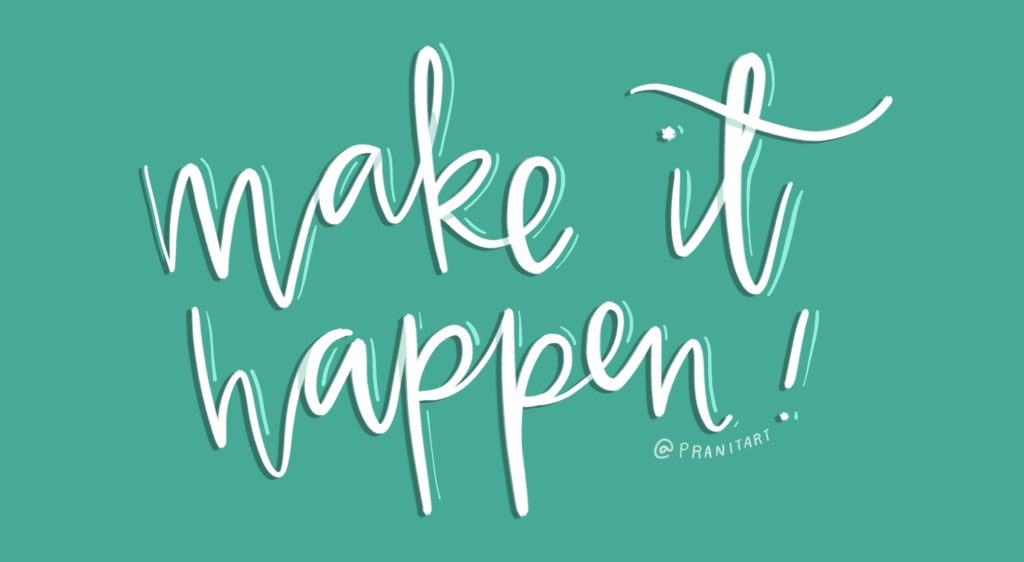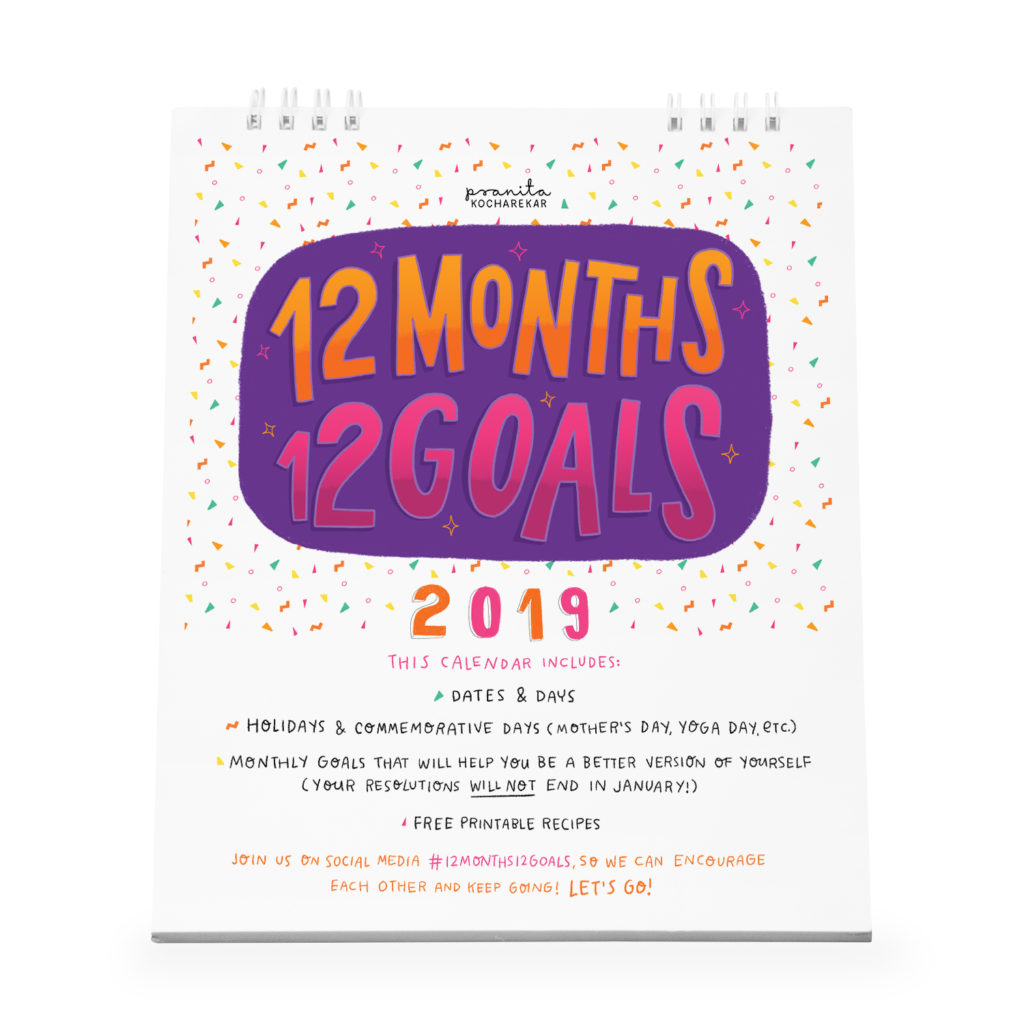There’s too much to do so you don’t do anything. Sounds too familiar, doesn’t it?
I’ve got your back! I’ve been asked so often about how I stay motivated, how I plan my tasks & execute everything all at once. So I’m sharing all my tips, tricks & hacks in this blogpost 🙂
Greg S. Reid said,

To be able to achieve anything you require an organised system. A system that favours your functioning and helps you lay out your dreams in an achievable manner.
TIME
I break my time into four sections:
– Time for commissioned work
– Time for personal work
– Time for friends & family
– Time for myself
One must work around a system that suits well depending on their lifestyle. Here’s what I do:
– Early mornings are for myself
– Mornings to early evenings are for commissioned work
– Early evening to late evening for personal work
– Nights and weekends for friends & family
Of course, this keeps changing depending on the situation (a tight deadline, a family function to attend, etc.). But having a system to follow always helps you divide your time efficiently.
PROJECTS & PLANS
I’ll elaborate this further with an example. Let’s say, I want to work on a project that is a series of illustrations to be printed on postcards. It sounds simple but requires a lot of planning to achieve quality work. I break it down as:
1) Setting timelines
Do some backward math of how long the entire process will take you & set yourself a timeline
2) Jot down the process
In this case, thinking of ideas, reworking on the ideas, finalising the ideas, creating rough sketches, finalising rough sketches, creating drafts, finalising draft, creating finals, getting sample prints to check colours, finalising colours, contacting printer to check availability, setting a date for printing, getting prints, finalising a time with the cutter, cutting the postcards, purchasing packaging materials, packaging, photography, photo edits, product copy, website backend, launch strategy , etc. phew!
3) Allotting time
Based on other priorities, allot each of your jotted tasks a designated time. Fully understand how long a certain task will take and create a schedule accordingly. You will make mistakes and go over/under budget time in the beginning, but start nonetheless- you will get better at estimating this over time.

What happens when you’re working on multiple projects at the same time?
More planning! Resort to using various resources to plan projects efficiently.
I’ll give you my personal example,
– A physical calendar for planning social media content
– A planner for meeting dates, financial investment reminders, long term (yearly/ monthly goals)
– A to-do list app (I use ‘Todoist’) for daily tasks
– Google docs for jotting ideas project wise
– Google sheets for financing
– Evernote for jotting personal project ideas
– Slack for discussions with my team
All of the above #notsponsored!
Every idea has its own place, which makes it more organised and simpler to access.
Long term & short term planning
Here’s another thing I strongly believe in – planning long term & short term and learning to be flexible to alter all plans.
Long term planning
At the beginning of every year, I create a long list of projects/ goals I want to work on. It could be an art project, or a goal of wanting to be fitter. I break down every project and goal into 3-4 sections that will help me achieve the goal, let’s talk examples again –
Project – Calendar
Tasks – Ideate calendar, roughs for calendar, finals for calendar, printing of calendar
OR
Goal – Be fitter
Tasks – Track water intake, learn to cook healthy, introduce new workouts
Monthly planning
I then gather these tasks and assign them to various months throughout the year. This gives every month of the year small tasks that will be building up to a final goal.
Of course, these goals can change over the year, new goals can be introduced mid way, etc.
Make sure you leave space for commissioned projects and having a flexible schedule to add or subtract anything, if needed.
Besides that, I also ensure that at the beginning of every month, I make notes of what has been achieved, what hasn’t been achieved and the reason behind them. Jotting your progress will always help you stay more aware & consequently help you rework on the rest of the year.
Weekly planning
I do all my weekly planning on Todoist, a to-do list app. From exercising, to purchasing a hair clip, to making bank visits, to finishing tasks – everything is jotted down carefully at the beginning of every week. Once again, you must be flexible with your tasks. Its okay to push things here and there every once in a while. Because we aren’t always 100% mentally fit to hustle, right? 🙂
But hoooooowww?
That is, in a crux how I plan my year! To be able to achieve all of the above, I ensure I have a disciplined lifestyle that suits my needs. Here’s what I do:
1) Wake up daily to read for an hour – helps to regain focus
2) Make sure I have atleast 2-3 hours of time with family and friends before bed every night
3) Workout every damn day! Working out is like meditation for me – helps regain focus
4) Sundays are for sleeping. Period.
5) Learn to say no, and get over FOMO for late nights during the week.
6) Start my day with a small task. When you feel accomplished, you motivate yourself to work harder
7) Use technology to the fullest, quick list of phone apps I use:
– Gmail for emails
– Shopify to keep my online store orders in check
– Google sheets for financing
– Google docs for project planning
– Slack for project discussions between my team
– Buffer to schedule social media posts
– VSCO for quick photo edits, if needed
(Again, #notsponsored)
I hope this helped! If you have any tips you’d like to share, please comment down below!
Much love,
Pranita!
Want to hear more about upcoming blog posts, new product launch, giveaways, promo codes, etc.? Just fill in your details and hit subscribe! 🙂












